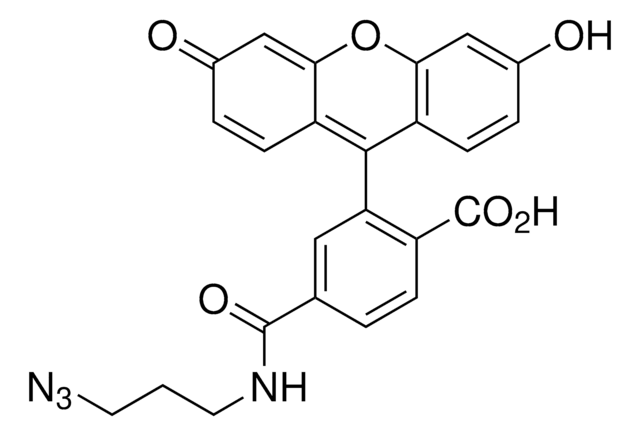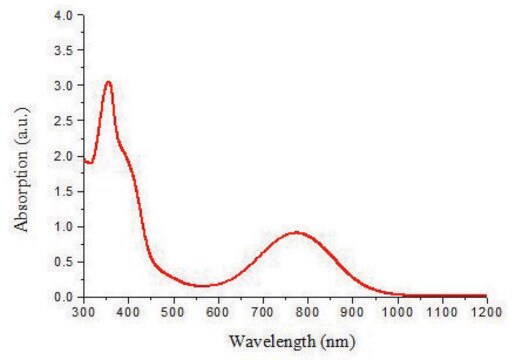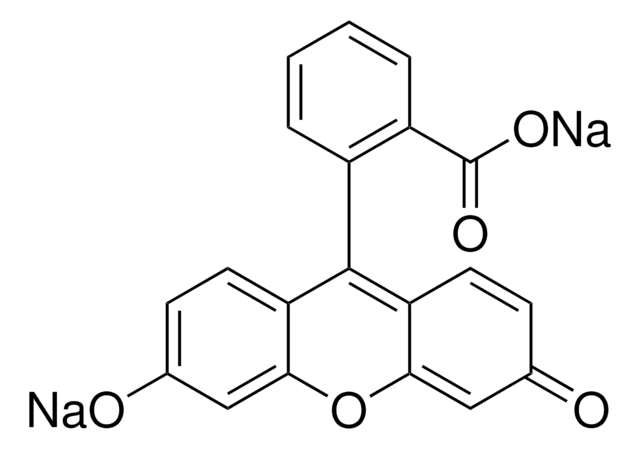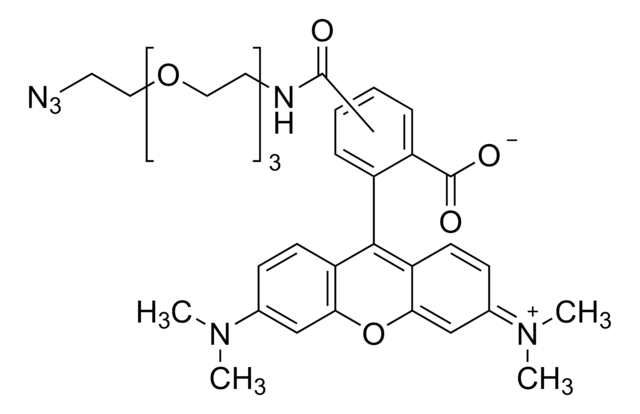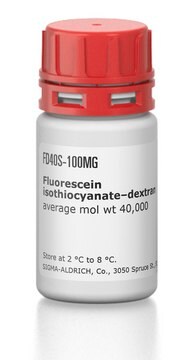68517
Atto 633 azide
suitable for fluorescence, ≥90% (HPLC)
Sign Into View Organizational & Contract Pricing
All Photos(1)
About This Item
UNSPSC Code:
12352125
NACRES:
NA.32
Recommended Products
Quality Level
assay
≥90% (HPLC)
form
solid
manufacturer/tradename
ATTO-TEC GmbH
solubility
DMSO: 1 mg/mL, clear
λ
in ethanol (with 0.1% trifluoroacetic acid)
UV absorption
λ: 627-633 nm Amax
suitability
suitable for fluorescence
storage temp.
−20°C
General description
Atto 633 belongs to a new generation of fluorescent labels for the red spectral region. The dye is designed for application in the area of life science, e.g. labelling of DNA, RNA or proteins. Characteristic features of the label are strong absorption, high fluorescence quantum yield, high photostability, good water solubility, and very little triplet formation. Atto 633 is a cationic dye. After coupling to a substrate the dye carries a net
electrical charge of +1. In common with most Atto-labels, absorption and fluorescence are independent of pH, at least in the range of pH 2 to 11, used in typical applications.
The azide modification is suitable for reactions with alkyne groups (Huisgen reaction - “Click Chemistry“).
find more information here
electrical charge of +1. In common with most Atto-labels, absorption and fluorescence are independent of pH, at least in the range of pH 2 to 11, used in typical applications.
The azide modification is suitable for reactions with alkyne groups (Huisgen reaction - “Click Chemistry“).
find more information here
Packaging
Bottomless glass bottle. Contents are inside inserted fused cone.
Legal Information
This product is for Research use only. In case of intended commercialization, please contact the IP-holder (ATTO-TEC GmbH, Germany) for licensing.
Storage Class
11 - Combustible Solids
wgk_germany
WGK 3
flash_point_f
Not applicable
flash_point_c
Not applicable
Choose from one of the most recent versions:
Certificates of Analysis (COA)
Lot/Batch Number
Don't see the Right Version?
If you require a particular version, you can look up a specific certificate by the Lot or Batch number.
Already Own This Product?
Find documentation for the products that you have recently purchased in the Document Library.
Maria Strianese et al.
Protein and peptide letters, 18(3), 282-286 (2010-09-23)
A new, fast, simple and cost-effective sensing device for monitoring H(2)S has been developed. Proof-of-principle results showing that a commercial and cheap Myoglobin (Mb) can be successfully used as a biological probe for a fluorescence biosensor for H(2)S detection are
Julian Weichsel et al.
Cytometry. Part A : the journal of the International Society for Analytical Cytology, 77(1), 52-63 (2009-11-10)
The actin cytoskeleton modulates a large variety of physiological and disease-related processes in the cell. For example, actin has been shown to be a crucial host factor for successful infection by HIV-1, but the underlying mechanistic details are still unknown.
Thomas D Lazzara et al.
Journal of colloid and interface science, 366(1), 57-63 (2011-10-29)
Anodic aluminum oxide (AAO) substrates with aligned, cylindrical, non-intersecting pores with diameters of 75 nm and depths of 3.5 or 10 μm were functionalized with lipid monolayers harboring different receptor lipids. AAO was first functionalized with dodecyl-trichlorosilane, followed by fusion
Ronny Schmidt et al.
Journal of proteome research, 10(3), 1316-1322 (2011-01-21)
Based on a single-molecule sensitive fluorescence-linked immunosorbent assay, an analytical platform for the detection of lipoarabinomannan (LAM), a lipopolysaccharide marker of tuberculosis, was established that is about 3 orders of magnitude more sensitive than comparable current ELISA assays. No amplification
Benjamin Strauss et al.
Nucleic acids research, 40(2), 861-870 (2011-09-16)
Chemical probing is a common method for the structural characterization of RNA. Typically, RNA is radioactively end-labelled, subjected to probing conditions, and the cleavage fragment pattern is analysed by gel electrophoresis. In recent years, many chemical modifications, like fluorophores, were
Our team of scientists has experience in all areas of research including Life Science, Material Science, Chemical Synthesis, Chromatography, Analytical and many others.
Contact Technical Service
